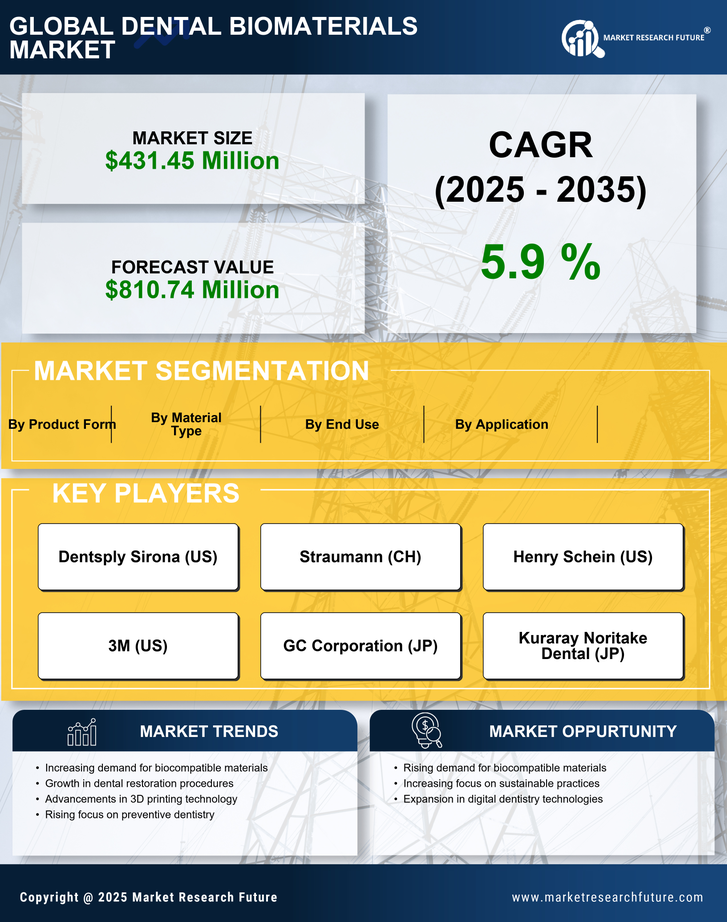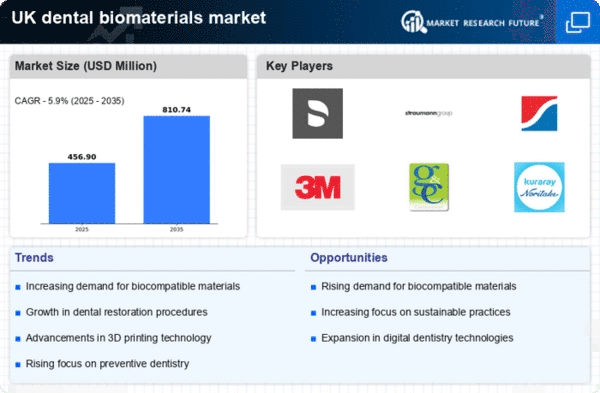Increasing Geriatric Population
The dental biomaterials market is poised for growth due to the increasing geriatric population in the UK, which necessitates a higher demand for dental care services. As individuals age, they often experience dental issues that require restorative treatments, such as implants and dentures. The Office for National Statistics indicates that the proportion of individuals aged 65 and over is projected to rise significantly, leading to an increased need for dental biomaterials. This demographic shift suggests that the market could expand by approximately 5% over the next few years, as dental professionals adapt to the needs of an aging population, thereby driving demand for various biomaterials.
Growing Awareness of Oral Health
There is a growing awareness of oral health among the UK population, which is driving demand for dental services and, consequently, the dental biomaterials market. Public health campaigns and educational initiatives have highlighted the importance of maintaining good oral hygiene and seeking timely dental care. This heightened awareness is leading to an increase in preventive and restorative dental procedures, thereby boosting the demand for various biomaterials. The dental biomaterials market is anticipated to grow by approximately 5% as more individuals seek treatments that utilise advanced materials, reflecting a shift towards proactive oral health management.
Rising Demand for Aesthetic Solutions
The dental biomaterials market experiences a notable surge in demand for aesthetic solutions, driven by an increasing consumer preference for visually appealing dental treatments. Patients are increasingly seeking materials that not only restore functionality but also enhance the appearance of their smiles. This trend is reflected in the growing use of composite resins and ceramics, which are favoured for their aesthetic qualities. In the UK, the market for aesthetic dental biomaterials is projected to grow at a CAGR of approximately 7% over the next five years. As dental professionals strive to meet these aesthetic demands, the dental biomaterials market is likely to expand, offering innovative solutions that cater to patient expectations.
Regulatory Support for Advanced Materials
Regulatory bodies in the UK are increasingly supportive of the development and approval of advanced dental biomaterials, which positively impacts the market. The Medicines and Healthcare products Regulatory Agency (MHRA) plays a crucial role in ensuring that new materials meet safety and efficacy standards. This regulatory framework encourages innovation and instills confidence among manufacturers and practitioners. As a result, the dental biomaterials market is likely to see a rise in the introduction of novel products, with an expected growth rate of around 4% in the coming years. This supportive environment fosters a landscape where new technologies can thrive, ultimately benefiting patients and dental professionals alike.
Technological Innovations in Material Science
Technological advancements in material science significantly influence the dental biomaterials market, leading to the development of superior products with enhanced properties. Innovations such as 3D printing and nanotechnology are revolutionising the production of dental materials, allowing for customisation and improved performance. For instance, 3D-printed dental implants and prosthetics are gaining traction due to their precision and reduced production time. The UK dental biomaterials market is expected to witness a growth rate of around 6% annually, as these technologies become more accessible to dental practitioners. This evolution not only improves patient outcomes but also drives competition among manufacturers to innovate and differentiate their offerings.

















